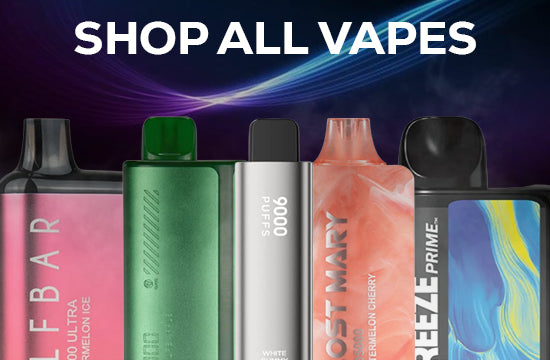Welcome to Our Comprehensive Guide to Vaping: Unraveling the Myths and Facts
In recent years, vaping has surged in popularity as a perceived safer alternative to traditional smoking, offering users a way to enjoy nicotine and flavors without the combustion and harmful chemicals associated with combustible tobacco. However, alongside its rise in popularity, vaping has also sparked numerous questions, debates, and concerns. From legal regulations and health implications to practical tips for vapers, this blog aims to provide clarity on the diverse aspects of vaping. Whether you're a curious newcomer or a seasoned enthusiast, join us as we navigate the complexities of the vaping world, unraveling myths, exploring facts, and shedding light on this evolving phenomenon.
Exploring Common Vaping Questions:
Q: What are e-cigarettes or vapes?
A: E-cigarettes, commonly referred to as vapes, are battery-operated devices that produce an aerosol by heating a liquid that users inhale. These devices come in various shapes and sizes and are often marketed as alternatives to traditional cigarettes.
Q: What do vapes look and smell like?
A: Vapes come in different shapes and sizes, with some designed to resemble everyday objects like cigarettes, pens, or USB devices. The liquids used in vapes, known as e-liquids, can contain flavors that make them smell and taste sweet, while others may have a scent reminiscent of incense or candies.
Q: What is in a vape?
A: Vapes can contain up to 200 chemicals, including nicotine, formaldehyde, and heavy metals like nickel and lead. Despite labeling claims, most vapes sold in Australia contain nicotine, which can be addictive and harmful to health.
- formaldehyde (used in industrial glues and for preserving corpses in hospitals and funeral homes)
- acetone (generally found in nail polish remover)
- acetaldehyde (used in chemicals, perfumes, and plastics)
- acrolein (commonly found in weedkiller)
- heavy metals like nickel, tin, and lead.
Q: Do vapes list all the ingredients they contain on the pack?
A: Vapes don't always provide accurate or complete ingredient lists on their packaging. Some may be labeled as "nicotine-free" but still contain nicotine, posing potential health risks to users.
Q: What are the short-term risks for me if I vape?
A: Short-term vaping can lead to various health issues, including irritated mouth and airways, persistent coughing, nausea, vomiting, and nicotine poisoning. Vaping can also increase the risk of burns or injuries if the device overheats or explodes.
If you’re under 25 and vape, some of the short-term risks you're exposed to are:
- irritated mouth and airways
- persistent coughing
- feeling out of breath
- feeling nauseous and vomiting
- seizures from inhaling too much nicotine or swallowing e-liquid
- burns or injury when the vape overheats or explodes
- addiction symptoms from the nicotine in vapes
- feeling more stressed or anxious.
Q: What are the long-term risks for me if I vape?
A: Long-term vaping can have serious health consequences, including addiction to nicotine, breathing problems, permanent lung damage, and adverse effects on brain development. Some chemicals found in vapes are known to cause cancer, although the full extent of vaping's long-term effects is still being studied.
Q: What is nicotine poisoning?
A: Nicotine poisoning can occur when liquid nicotine from a vape is ingested or absorbed in large quantities. Symptoms may include
- feel nauseous
- vomit
- feel dizzy or have head spins
- feel confused
- have headaches
- experience your heart rate changing.
Later, you might also:
- have diarrhoea
- experience shallow breathing
- lose your appetite
- feel weak
Nicotine poisoning can be serious and requires immediate medical attention.
Q: Why is nicotine addictive?
A: Nicotine is highly addictive and affects brain chemistry, leading to the release of dopamine, a neurotransmitter associated with pleasure and reward. Over time, the brain becomes dependent on nicotine to produce these feelings, leading to addiction and withdrawal symptoms when nicotine intake is reduced or stopped.
Q: Is selling vapes to a person under 18 years illegal?
A: Yes, it is illegal to sell vapes to individuals under 18 years of age in Australia, regardless of whether the vape contains nicotine. These laws are in place to protect young people from the potential harms of vaping.
Q: What will help me quit vaping?
A: Quitting vaping can be challenging, but there are various resources and support available to help individuals quit and stay vape-free. This includes reading up on the experience of going vape-free, seeking support from friends, family, or quit services, creating a quit plan, finding motivation to quit, and persevering through cravings.
With these questions answered, you now have a better understanding of the complexities of vaping and its potential risks. Whether you're considering vaping for the first time or looking to quit, it's essential to stay informed and make decisions that prioritize your health and well-being. If you have any further questions or concerns, don't hesitate to reach out to healthcare professionals or quit support services for assistance. Remember, your health matters, and there are resources available to support you on your journey to a vape-free life.
Additional Resources:
For further information and support regarding vaping, tobacco use, and related health concerns, consider exploring the following resources:
- Centers for Disease Control and Prevention (CDC) - Smoking & Tobacco Use: Offers comprehensive information on tobacco use, including vaping-related resources and updates.
- U.S. Food and Drug Administration (FDA) - Vaping Products: Provides regulatory information and safety alerts related to vaping products. FDA Vaping Products
- National Institute on Drug Abuse (NIDA) - Vaping and Nicotine Addiction: Offers insights into the effects of nicotine and vaping on health and behavior. NIDA Vaping and Nicotine Addiction
- U.S. Surgeon General - E-cigarette Use Among Youth and Young Adults: Provides reports and resources on the public health concerns surrounding youth vaping. Surgeon General - E-cigarette Use Among Youth
- Substance Abuse and Mental Health Services Administration (SAMHSA) - Smoking and Tobacco Use: Offers resources and support for tobacco cessation efforts.


